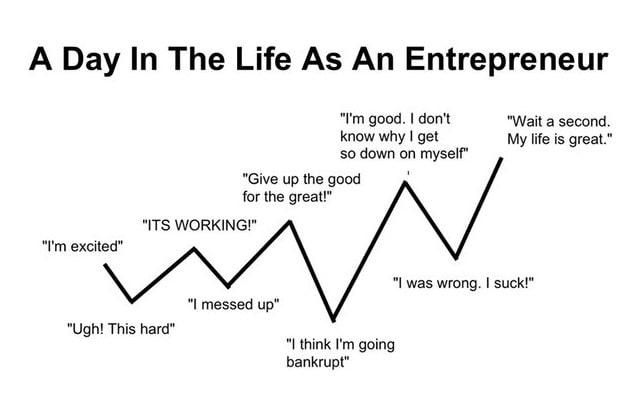Entrepreneurs and their businesses vary greatly depending on their individual goals, industry, product or service. However, the characteristics of successful entrepreneurs are extremely similar, no matter the organization. As a self-starter required to be a jack of all trades, entrepreneurs must possess multiple abilities, skills and personality traits.
Editor's note: Ready to start your entrepreneurial journey? Website Builder from GoDaddy is the perfect place to start.

Go from idea to online in minutes with GoDaddy Airo™
Get started now.
20 characteristics of successful entrepreneurs
If you plan to start your own business, launch a startup or simply become a solopreneur, you can use this list of 20 entrepreneur characteristics to build and refine your skillset.
- Passion.
- Empathy.
- Strong communication skills.
- Ability to sell.
- Accepts criticism well.
- Competitiveness.
- Confidence.
- Willingness to ask for help.
- Creative thinking.
- Determination.
- Disciplined.
- Flexibility.
- Perseverance.
- Resilience.
- Strong work ethic.
- Tenacity.
- Vision.
- Wise with money.
- Strong people skills.
- Commitment to physical and mental health.
Let’s take a look at each point below.
1. Passion
Passion is the fuel that drives an entrepreneur’s ambitions and aspirations.
You need to feel passionate about your idea in order to gain momentum.
It’s the reason to get up in the morning and work long hours into the night. As your business takes shape, passion will shine through in your investor pitch, marketing, who you hire for your team — every aspect.
That’s why passion is a foundational trait of successful entrepreneurs. If you aren’t enthusiastic, excited, and even a little obsessed with your business, you won’t go far.
Related: Quiz — Do you have what it takes to be your own boss?
2. Empathy
Empathy as a leader means you can perceive other’s feelings and respond accordingly because you’ve had similar experiences. As an entrepreneur, this character trait can translate to overall better business practices.
In her article, 4 Reasons Why Empathy Is Good for Business, author and speaker Maria Ross, explains:
“Our ability to see the world from the perspective of others is one of the most crucial tools in our business toolbox.”
Ross details how empathy can boost sales because you understand the struggles of your target audience. Therefore you can relevantly market how your product or service will solve their problems.
What’s more, empathetic teams are more productive and innovative — two skills every startup needs for success.
3. Strong communication skills

Entrepreneurs need to communicate with every stakeholder involved in their business. From contractors to clients, and everyone in between, effective communication is a must. This invaluable skill is also a predictor for successful teams.
In a study of 1,400 corporate executives, employees, and educators, 86% cited a lack of collaboration and ineffective communication for workplace failures.
Additionally, as your business grows, you’ll need to draw on those communication skills to offer feedback and guidance to your team. An OfficeVibe survey found that 83% of employees appreciate feedback, both positive or negative. However, 63% report not getting enough feedback.
Jump ahead of the curve and hone your entrepreneurial communication skills to set yourself up for successful collaboration and relationships.
Related: 5 effective communication tips for leaders
4. Ability to sell
When you start your business as a solopreneur, you will likely be the primary salesperson. You’ll need to be able to sell your product or service in the obvious ways, like pitching investors or closing deals. But don’t forget, you also need to sell you, your business and your vision to your first employees (even freelancers) to convince them to jump on board.
Editor's Note: Buy a domain from GoDaddy and start selling online today!
5. Accepts criticism well
Rejection is in the nature of business, especially with a startup. Entrepreneurs face criticism of their ideas, processes, initial prototype, etc.
A trait of successful entrepreneurs is not taking that criticism personally.
Instead, see it as constructive feedback and a chance to improve. While this is easier said than done — as your blood, sweat, and tears go into a business — aim to take critique in stride. Take a beat to let yourself feel disappointment (if needed) then move on.
6. Competitiveness
When starting a new business, you face a crowded playing field. Entrepreneurs commonly campaign to be the best in their vertical or create a new product that fills a void. This sense of competition leads to innovation.
Competition also helps an entrepreneur stay ahead of other companies. In an article for Babson College, Elizabeth Atwater interviewed athletes and entrepreneurs to understand the role of competitive drive in both sports and business.
Atwater says:
“[The] scenario plays out in business much the same way as it does in athletics. Organizations or teams that don’t have an eye on their competition risk being caught off guard or missing market expectations altogether, which can be a major setback to a business.”
Use your competition to stay sharp and you’ll keep ahead of the curve.
Relevant: How to find inspiration from your competitors (without stealing their ideas)
7. Confidence
Entrepreneurs face ups and downs throughout the day. It’s an emotional rollercoaster of doubt and excitement. Derek Halpern, founder of Social Triggers, originally created the below graphic, which went viral because anyone running a business can absolutely relate.

A healthy dose of confidence is what helps an entrepreneur ride out the doubts.
If you feel low on confidence, improv classes are a surprising way to build your self-assurance. Improv comedy helps you think on your feet, speak in front of audiences (which translates to pitching investors), as well as stay calm in the face of the unexpected.
Related: How to build confidence as a new entrepreneur
8. Willingness to ask for help
A caveat to confidence is knowing when to ask for help.
Smart entrepreneurs don’t confuse confidence with stubbornness or bravado.
While you can be a one-(wo)man-show to start your business, you can’t do everything.
Recognize when you need assistance from another expert. This can mean outsourcing specialized tasks like taxes or legal documents, or even asking peers for advice and guidance.
9. Creative thinking
Creativity is one of the entrepreneur characteristics you might feel like you’re either born with or not (i.e., the famous “right versus left brain” argument). However, anyone can hone their creativity. Michael Michalko’s book, Creative Thinkering, offers insightful advice and exercises to increase creative abilities.
Remember that creativity doesn’t solely refer to artistic capabilities, but also inventive problem-solving, or unusual marketing concepts to target your audience.
In entrepreneurship, creativity translates to an out-of-the-box thought process that drives innovation and creates new products or services in a busy landscape.
10. Determination
Determination can also be a tricky entrepreneur trait, in that you need to get things done and be determined to do so; however, they are more tasks to accomplish than possible.
The right determination lies in between understanding how to execute, but not getting stuck by wanting everything to be flawless.
You may have heard of the startup mantra “done is better than perfect,” (which was painted on the walls of early Facebook HQ). As an entrepreneur, your livelihood is tied to launching a website, product, service, blog, or application.
You need the determination to conquer the never-ending to-do list, but also the good sense to know that it can’t always be perfect.
11. Disciplined
Not having a boss is a common cliche of entrepreneurship, because there is a boss, it’s just you. You might not answer to anyone else, which is a pro, but a con is that no one will keep you accountable.
Successful entrepreneurs must be disciplined to set due dates, meet them, stay on course (even when they aren’t sure what the course is), and stay focused.
Related: How to set up an accountability mastermind group
12. Flexibility
No matter your industry, it’s continuously evolving, especially in the digital age. Entrepreneurs need to have their heads on a swivel.
Flexibility is an imperative trait.
Speaking of heads, you also wear multiple hats (at least while you’re getting your business off the ground). For those who’ve worked in large companies, you’ll immediately notice the lack of administrative support.
Entrepreneurs play every role and must be an expert project manager while doing so. As such, having a flexible, can-do attitude eases the load.
On a high level, entrepreneurs also need to pivot business plans and processes based on industry trends or investor feedback. In the startup environment, agility and willingness to change are necessities, lest you get stuck behind the times.
13. Perseverance
Perseverance is the ability to stay the course when difficult factors pop up. Dr. Martin Seligman is known as the founder of Positive Psychology as well as positive self-talk. He defines perseverance with the “3 P’s.”
Here’s how you can relate the concept to entrepreneurship:
- Personalization: You can’t feel that everything is your fault; outside circumstances are always at play. This is especially important as an entrepreneur (a.k.a. the face of a company). Take responsibility for failures, but don’t play the self-blame game.
- Pervasiveness: Isolate negative events and define the single mistake or issue, but don’t apply that to your business as a whole. For example, it’s OK to admit “this feature will not work,” but know that doesn’t equate to “my product is a complete failure.”
- Permanence: Hone your perseverance by seeing setbacks as temporary. Just because a marketing campaign performed poorly, doesn’t mean your entire project is doomed.
14. Resilience

We’ve all heard the phrase, “if at first you don’t succeed, try try again.” That’s a simple definition of resilience. For entrepreneurs, resilience translates to following-up in the face of several responses of “maybe” or “not interested.”
You need to have the sheer pluck to get past a gatekeeper and ask again.
Resilience can also be trying new prototypes or tests to get your product right. It’s whatever it takes to get back on the horse.
A scientific study found that three main factors of resilience can predict entrepreneurial success: hardiness, resourcefulness, and optimism. (Additionally, stay hopeful ladies, because they also found that optimism is specifically more important for female entrepreneurs than males).
15. Strong work ethic
A strong work ethic is one of the entrepreneur characteristics you can’t start your business without. Yes, one day, all entrepreneurs want to retire early, sleep in, and spend their days on the beach — that’s the dream.
However, in the beginning, expect to put in long hours, day and night. Especially for those side-hustlers starting a business on top of a normal job. Those who succeed find the time to devote to their business and understand that it’s a large sacrifice now for a big reward later.
Related: What are work values and why do they matter for career planning?
16. Tenacity
Being tenacious is similar to several other entrepreneur traits, but with an extra spark. Tenacity helps leaders not only stay positive but also upbeat in the face of adversity.
A tenacious entrepreneur can be told “no” in five consecutive pitch meetings and still go into the next one with a smile on their face. Tenacity will let you see hardship and failures not as stopping points but learning opportunities.
17. Vision

An entrepreneur’s vision goes hand in hand with their passion; it’s the main driving force of their business. A vision is more than goals or objectives, but a high-level view of what they want and need to succeed.
The best entrepreneurs are forward-thinking, in that they have more visions in mind after their first visions come true. They think several steps ahead and focus on how to scale once their startup hits key performance indicators.
While vision might seem like a buzzword for high-tech startups, it’s essential for every business.
18. Wise with money
Money is a common theme when it comes to entrepreneurship — you need to understand how to take a calculated risk with both your personal and business finances. Depending on the business model (product- or service-based versus a consultancy), you might not be profitable for a few years.
An entrepreneur needs to have the financial reserves to support themselves or the ability to work while starting their business.
Additionally, entrepreneurs must understand the startup capital needed to fund their business. For example, will you make the initial investment, look for investors, or apply for business loans?
While a financial advisor or CPA can certainly help, money management skills are invaluable to ensure success.
Related: 10 small business funding options
19. Strong people skills
Entrepreneurs come in all shapes and sizes with a variety of personalities to match. Whether you’re an introvert or extrovert, one thing is for certain: You will need to deal with people when starting a business.
Even in the digital, software-as-an-everything age, at some point, communicating and working with people will come into play. Whether it’s talking to someone about a small business loan, selling to customers, or finding freelancers to support your startup, an entrepreneur needs to be a “people person.”
Knowing how to interact with and even charm others will go a long way in any situation.
What’s more, other people can help you in the sense of networking, building a community of like-minded professionals, or just offering support. Learn to deal with and enjoy the company of other people. It will help you.
20. Commitment to physical and mental health
Research shows that entrepreneurs have a higher risk of burnout because they are so passionate about their work and often socially isolated. They also operate with high uncertainty levels and limited safety nets, which increases stress.
While it’s ironic that some of the traits of successful entrepreneurs (such as passion) lead to burnout, physical and mental wellness can prevent exhaustion, depression, or other health issues.
Entrepreneurship is a difficult journey.
You need to take care of both your body and mind to keep performing and leading at such a high-intensity level. Don’t be afraid to seek the help of a mental health specialist and take time off for exercise or rest.
Sharpen your entrepreneur characteristics
Whether you’re a new or seasoned entrepreneur, it’s an evolutionary process. No matter the stage of your startup or company, it’s never too late to build your skills. While the list of successful traits is long, when you perfect your entrepreneurial spirit, you will see immediate benefits in your business.
This article includes content originally published on the GoDaddy blog by the following authors: Christopher Carfi, Lawton Ursrey, Nellie Akalp and Thursday Bram.







